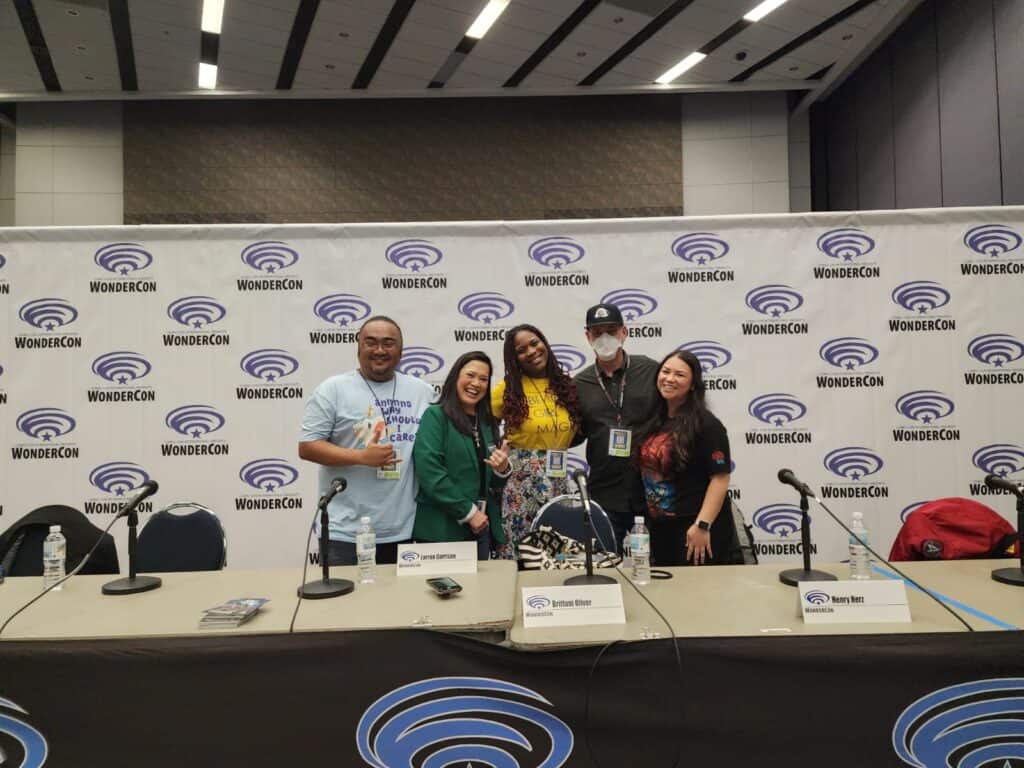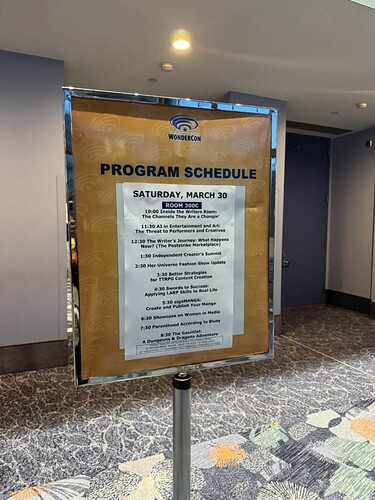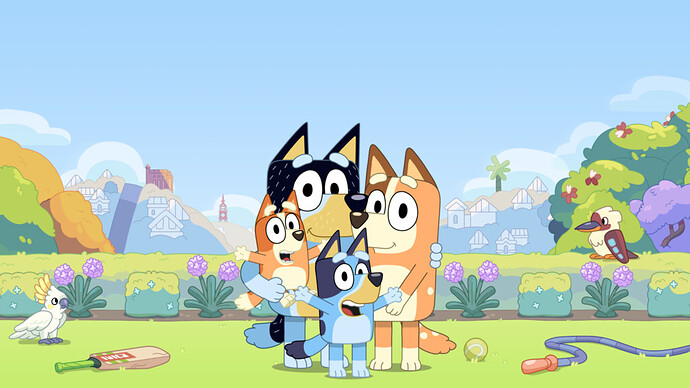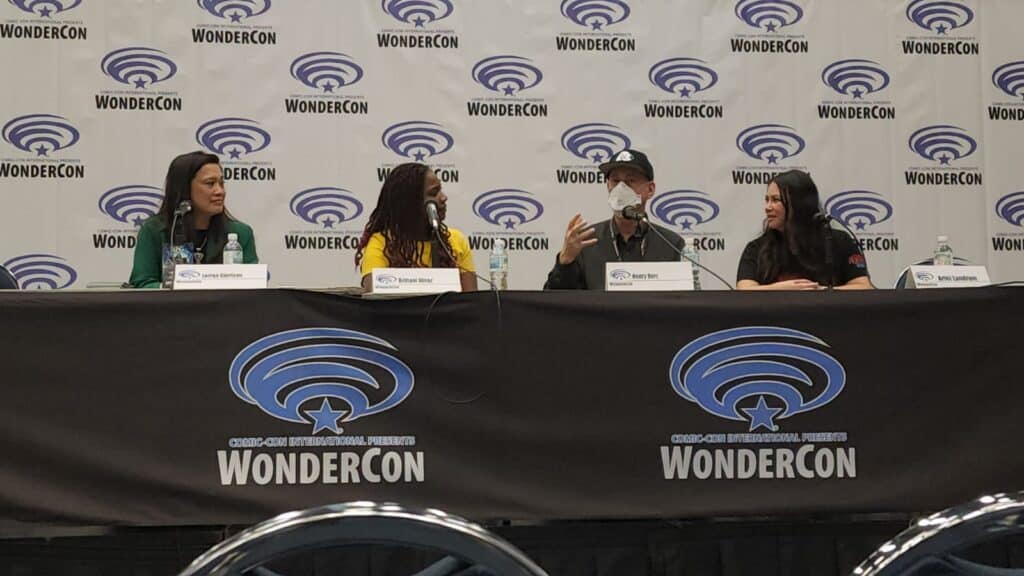Originally published at: Unpacking the Lessons of Bluey with WonderCon’s Finest Minds - People of Con
Author: Ariel Landrum
It’s evening at WonderCon 2024, and nestled within the spacious confines of Room 300C at the Anaheim Convention Center, a diverse group of panelists gathered to peel back the layers of a show that’s charmed the socks off not just kids but adults worldwide – Bluey. While ostensibly aimed at young viewers, this Australian children’s series has garnered an international fanbase of adults thanks to its heartfelt, nuanced exploration of parenting, personal growth, and even the complexities of grief, all wrapped in a child-friendly package.
The “Parenthood According to Bluey” panel, put together and moderated by Dr. Billy San Juan, a San Diego-based psychologist, educator, and writer renowned for his work in the psychology of popular culture, promised (and delivered) an evening of insightful discourse. The discussion explored the heart of Bluey’s appeal, the reasons behind its resonance with an adult audience, the psychological depth of its short, punchy episodes, and the real-world parenting and life lessons it imparts. The panel was as diverse and engaging as the show’s episode list, further enriched when Dr. San Juan’s son made an impromptu stage appearance, perfectly encapsulating the unpredictable joyful chaos of parenting that Bluey is known for.
The Panelists
Navigating the playful and sometimes messy world of Bluey requires particular expertise. Luckily, the panel was more stacked than a game of Magic Xylophone freeze-frames, featuring professionals who excel in their fields and share a deep connection with the show’s themes.
Lorran Garrison was the panel’s voice of skepticism, akin to an episode where Bluey questions the game’s rules. As a school psychologist and advocate for neurodiversity and BIPOC needs, Garrison’s critical eye on Bluey invited attendees to ponder the complexities of parenting and representation, countering the show’s widespread adoration.
Dr. Brittani Oliver Sillas-Navarro, known affectionately as Dr. Bri, brought the resilience and teamwork of a seasoned volleyball player turned therapist to the table. Specializing in grief and bereavement, her trepidation about watching Bluey due to its emotional depth resonated with many who fear opening the floodgates of their vulnerabilities. Her insights were valuable and appreciated.
Henry Herz leaped into the panel like Bingo on a trampoline. A San Diego-based author of ten picture books, Herz’s journey into writing started with a quest to share his love for fantasy with his two sons, proving that parenting can steer life down the most creative pathways. His humor throughout the panel was as refreshing as finding a quiet moment in the Heeler household.
Lastly, Ariel Landrum, LMFT, embodied the spirit of Geek Therapy, using clients’ passions and fandoms to foster connections and support their individuality. Her approach to therapy is as innovative and heartfelt as a Bandit-inspired adventure, proving that understanding and healing can come through the most unconventional yet relatable means.
Short But Mighty
Why are adults riveted by a children’s show about an Australian Blue Heeler family? The panelists dove into this question like Bluey into a pile of autumn leaves. Herz shared a heartwarming tale of how parenting led him down the path of creative writing, much like the imaginative play seen in Bluey. Dr. Oliver highlighted the show’s ability to tackle complex emotions and topics, making it a tool for adults to reflect on their own experiences with grief and loss, proving that Bluey can be as comforting as a cozy blanket on a rainy day.
Also, in a world where our attention spans are shorter than Muffin on her tiptoes, Bluey’s bite-sized episodes stand out for their depth and impact. Landrum praised the show for its ability to condense meaningful stories into digestible segments, allowing for both quick entertainment and profound reflections. The panel agreed that Bluey masterfully balances humor and life lessons, making each 7-minute adventure a treasure trove of emotional and educational gold.
Parenting, Pups, and Perspectives
Garrison, the panel’s self-proclaimed “Bluey skeptic,” sparked a thought-provoking discussion on the show’s portrayal of parenting styles and family dynamics. While some viewers see Bandit and Chili as paragons of playful, attentive parenting, Garrison raised questions about boundaries and respectful behavior, prompting a lively debate about the ideals and realities of raising children.
Every family has its quirks, and the Heeler clan is no exception. The panel navigated the choppy waters of criticism and defense with the agility of Bluey dodging bath time. While acknowledging the show’s occasional lapses into idealized parenting scenarios, the panelists also celebrated its strengths in fostering empathy, curiosity, and a sense of adventure among its viewers, both young and old. The panelists concurred that Bluey opens up a sandbox of opportunities for parents to discuss these themes with their kids engagingly.
Beyond Laughter and Games
Bluey doesn’t shy away from the big questions in life, nor did our panel. Dr. Oliver’s emotional journey through the episodes, particularly Season 1 Episode 39 Copycat, which focuses on death, underscored how Bluey mirrors our experiences with grief, joy, and the spaces in between. The show’s fearless exploration of themes like infertility and loss resonated with the panelists, who applauded its ability to serve as a gentle guide for adults navigating their emotional landscapes.
The panel explored how Bluey catalyzes conversations around complex emotions and life events, topics that can be difficult for young viewers to articulate. Landrum emphasized using media to introduce children to life, loss, and resilience. She also discussed how the show’s slice-of-life episodes normalize the ups and downs of parenting and growing up. From the chaos of organizing a playdate to the challenges of going to the theater with young children, Bluey’s authentic portrayals offer valuable portrayals of everyday struggles, helping to demystify and normalize these experiences.
By weaving critical life lessons into engaging narratives, Bluey entertains and educates, bridging deeper understanding and connection between parents and children. The consensus was clear: when media thoughtfully addresses the spectrum of human emotion, it becomes an invaluable ally in the journey of emotional growth and healing, demonstrating that stories, even those told in eight-minute snippets about animated dogs, can have a profound impact on our understanding of ourselves and each other.
Good Enough Parenting
In a moment of candid reflection, Herz offered a writer’s perspective on the nature of characters in children’s media, noting the intentional choice by Bluey’s creators to depict less-than-perfect parental figures for relatability and entertainment. Drawing parallels with classic children’s literature like Cat in the Hat, Herz pointed out that not every character needs to be a paragon of virtue to be effective or meaningful. This approach, he argued, offers a more realistic portrayal of family life, where imperfections are part of the fabric of daily existence.
“Consider the first episode,” Herz remarked, “where Bandit’s playful disruptions contrast with Chili’s attempt to settle Bluey for bedtime. This scenario, while humorous, underscores a broader truth: families are a mix of chaos and love, mistakes and learning.” He emphasized that these imperfections don’t detract from the show’s value but rather enhance its authenticity, inviting parents and children to discuss and navigate the complexities of behavior and consequences together.
Herz’s observations underscore a crucial point: Bluey highlights the beautifully flawed reality of parenting, offering both laughs and learning opportunities. It challenges the notion of the “perfect parent” and celebrates raising children’s messy, unpredictable, and ultimately rewarding journey.
The dialogue around Bluey and its portrayal of parenting—imperfect, humorous, yet deeply loving—opened up a broader conversation on the principle of “good enough parenting.” This concept, woven subtly through the panel’s narrative, champions the idea that perfection in parenting is unattainable and unnecessary. The panelists, echoing this sentiment, shared their personal and professional insights into the show’s capacity to reflect the real-life juggle of parenting responsibilities, joys, and missteps.
In its storytelling, Dr. Oliver and Landrum highlighted how Bluey creates a safe space for parents and children to explore themes of loss, joy, responsibility, and conflict. They noted that the show does not shy away from presenting scenarios where parents, like Bandit and Chili, navigate their imperfections. Instead, it celebrates these moments as opportunities for growth, understanding, and a more profound connection with their children. This narrative approach endears the show to adult viewers and reminds them that being a “good enough” parent involves embracing one’s vulnerabilities and learning from them.
Moreover, the panel underscored the importance of utilizing media like Bluey to initiate difficult conversations with children. Whether dealing with the loss of a pet, as depicted in the episode Copycat (S1E38), or addressing feelings of jealousy and competition among siblings, Bluey provides a gentle yet effective framework for discussing life’s challenging aspects. The panelists concurred that such conversations, though complex, are essential for emotional development and can be facilitated by the relatable and heartfelt narratives found in the show.
Bluey, through its portrayal of the Heeler family’s adventures and misadventures, thus becomes more than just a children’s show—it transforms into a conduit for “good enough parenting.” It encourages parents to find teaching moments in everyday experiences, to laugh at the chaos, and to find joy in the imperfect journey of raising children.
As the laughter and applause settled like dust after a whirlwind game of Keepy Uppy in the Heeler household, the “Parenthood According to Bluey” panel left attendees with more than a deeper appreciation for a beloved children’s show. It provided insights into the complexities of parenting, the nuances of adult emotional growth, and the power of storytelling to bridge generational gaps, transcending the boundaries of a typical fan panel.
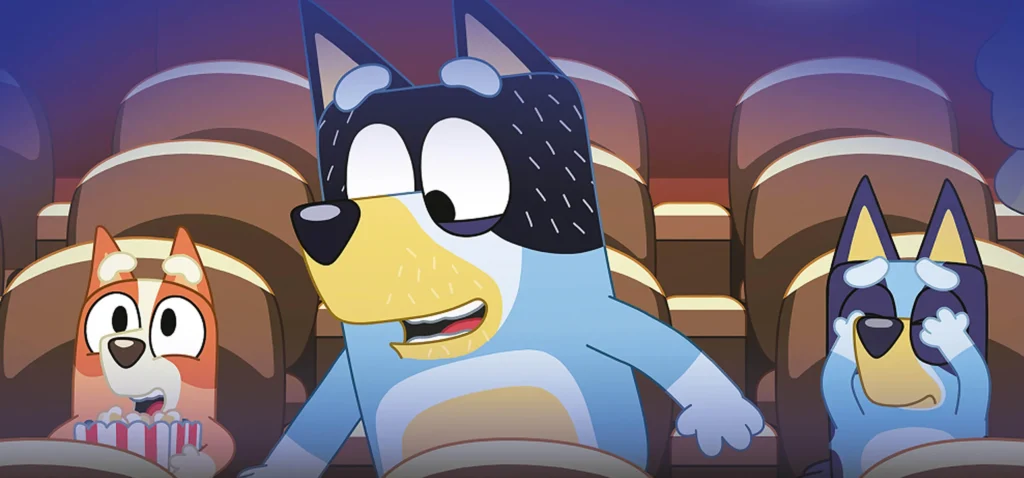
Join the Conversation
We’d love to hear from you! Have Bluey and its adventures sparked conversations, thoughts, or reflections in your own family? Share your stories, questions, or insights with us in the comments below or on social media.
Connect with Geek Therapy through our Facebook group, Instagram, and Discord. Let’s create a vibrant space where we can all share and learn from each other’s experiences with Bluey and how it touches our lives.
